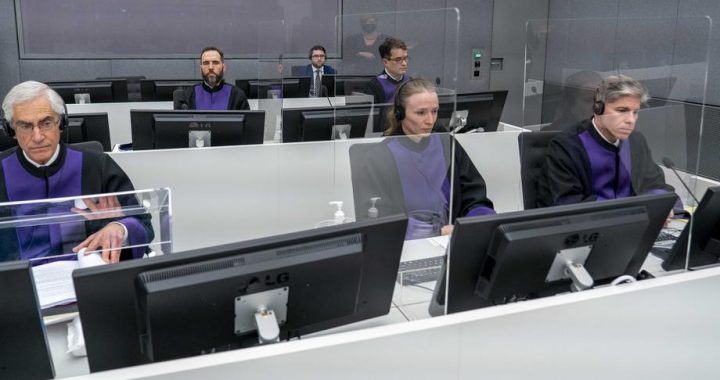

 Courtroom of the Kosovo Tribunal in the Hague, the Netherlands, 09 November 2020. EPA-EFE/JERRY LAMPEN
Courtroom of the Kosovo Tribunal in the Hague, the Netherlands, 09 November 2020. EPA-EFE/JERRY LAMPEN
Decision to hear the first witness in the trial of former Kosovo President Hashim Thaci and his three co-defendant in closed session raises concerns about transparency, experts say.
The first witness of the Kosovo Specialist Prosecutor’s Office in the trial of former Kosovo President Hashim Thaci and his three co-defendants was heard this week in the Hague in closed sessions – after the prosecution requested protection of the identity of the witness.
However, the decision has caused concern about the court’s transparency and about the right of the public to draw their own conclusions.
Amer Alija, legal analyst at the Humanitarian Law Centre Kosovo, which monitors the trials at the Specialist Chambers, told BIRN: “The court proceedings before the KSC have drawn a lot of interest from the Kosovar public and beyond; the court must find a solution between transparency/publicity and identity protection.”
In the court’s weekly press briefing on Thursday, spokesperson Michael Doyle said that “all trials before the KSC are public, however sometimes judges will decide to conduct part of the trial hearing in a so-called private session, or to redact certain information, to protect the identity and security of witnesses or victims”. Such decisions are made on a case-by-case-basis.
“The judges make sure to balance the need to protect witnesses with the rights of the accused,” Doyle added, noting that the witness was cross-examined by lawyers of the defendants despite the hearing being private.
Alija, however, told BIRN that several protective measures are already in place to protect the identity of the witnesses and still maintain parts of the testimony in public.
“What the trial panel can do is not to redact for the public those parts of the declarations that are not related to the identity,” Alija said, adding that the protective measures usually used in such procedures include “covering personal data, hearing through video connection, changing the voice and changing the appearance of the witness”.
“The public has the right, at the end of the process, to form its own evaluative opinion regarding whether the decision on the punishment or release of the defendants was meritorious,” Alija said.
Alija also told BIRN that “the complete closure of the hearings makes it difficult for monitors, journalists and the general public to follow the judicial process. Even professional monitors of the justice system will encounter difficulties if a large part of the main hearing is closed to the public.”
Thaci and his three co-defendants, Kadri Veseli, Rexhep Selimi and Jakup Krasniqi – all former Kosovo Liberation Army, KLA leaders who later became senior politicians – are charged with war crimes and crimes against humanity, allegedly committed between at least March 1998 and September 1999, during and just after the war in Kosovo with Serbian forces.
They are accused of having individual and command responsibility for crimes that were mainly committed against prisoners held at KLA detention facilities in Kosovo and neighbouring Albania, including 102 murders. The four have pleaded not guilty to all charges.
The prosecution presented its case on April 3. It claimed that the KLA had a well-structured chain of command that ensured the accused, as leaders of the force, were aware of what was happening on the ground and had control over it.
The defence argued over the next two days that the four men did not have control over members of what was a loosely-organised guerrilla force without a rigid military structure.
Thaci’s lawyers, Gregory Kehoe and Luka Misetic, said after the hearing on April 4 that previous cases against two former Kosovo guerrillas, Fatmir Limaj and Ramush Haradinaj, before the Yugoslav war crimes tribunal, had already proved that no crimes were committed as part of a “joint criminal enterprise”, as the indictment of Thaci and his co-defendants maintains.
The so-called Specialist Court is highly unpopular in Kosovo, where it is seen as unfairly targeting Kosovo Albanian freedom fighters rather than the Serbian perpetrators of the majority of the war crimes committed in 1998-99.
Albanians from the diaspora organised a protest outside the Specialist Chambers in support of the defendants as the trial started. Another protest attended by thousands of ethnic Albanians in Kosovo’s capital, Pristina, was held one day before the opening of the trial.
The Specialist Chambers are part of Kosovo’s judicial system, but are located in the Netherlands and staffed by internationals.
They were set up in 2015 by the Kosovo parliament, acting under pressure from Kosovo’s Western allies, who said Kosovo’s own justice system was not robust enough to try KLA cases and protect witnesses from intimidation. Previous trials at the Yugoslav war crimes tribunal were marred by witness-tampering.
14 April 2023 - 16:45

At the close of their trial in The Hague, the four former Kosovo Liber...

The defence for the four former Kosovo Liberation Army leaders said in...

Kosovo ex-President Hashim Thaci's defence said during closing stateme...

In closing statements, prosecutors said that ex-president Hashim Thaci...